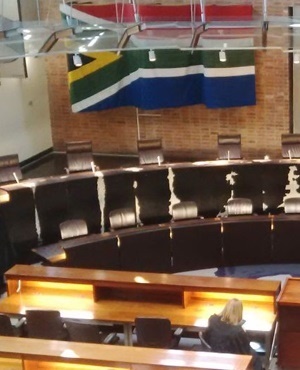
The decision by the Constitutional Court nullifying former president Jacob Zuma’s appointment of the country’s prosecutions boss three years ago closes an unhappy chapter in the country’s recent past. It undoes a wrong that threatened a key institution and the functioning of the criminal justice system in the fledgling democracy.
The court declared invalid the attempt by Zuma to terminate the appointment of National Director of Public Prosecutions, Mxolisi Nxasana. It ruled that Zuma had abused his power by offering Nxasana a golden handshake of more than R17m to get him to leave office. He eventually accepted the offer.
The court ordered Nxasana to pay back the money. And the majority of the judges ruled that he couldn’t return to the position because he’d accepted the hugely inflated – and unlawful – golden handshake as the price for leaving office.
The Constitutional Court also confirmed that Zuma’s subsequent appointment of Advocate Shaun Abrahams was unlawful and invalid. It ruled that when Abrahams was "appointed", there was no vacancy in the office of the National Director of Public Prosecutions. That’s because Nxasana was legally still serving in that position. As one cannot validly be appointed to a position that’s not vacant, Abraham’s appointment was thus unlawful and invalid.
Normally this would mean that all decisions taken, and acts performed, by Abrahams in his official capacity before his appointment was declared invalid would also be invalid. But, the court ruled that his decisions, including his decision to charge Zuma for racketeering, corruption, money laundering and fraud, remain valid. This, as to do otherwise would
"result in untold dislocation in the work of the NPA and in the administration of justice itself."
The golden thread running through the Constitutional Court judgment is a concern that the independence of the prosecuting authority has been compromised, and might again in future. This is deeply concerning as an honest and independent National Director of Public Prosecutions is pivotal to the proper functioning of the criminal justice system.
As Justice J Madlanga wrote in his majority opinion:
"With a malleable, corrupt or dysfunctional prosecuting authority, many criminals – especially those holding positions of influence – will rarely, if ever, answer for their criminal deeds. Equally, functionaries within that prosecuting authority may… 'be pressured… into pursuing prosecutions to advance a political agenda'."
According to Justice Madlanga, the fact that Zuma offered to pay Nxasana a "huge" amount of money from public coffers to vacate his office, created the "inescapable" inference:
"that he was effectively buying Mr Nxasana out of office. In my book, conduct of that nature compromises the independence of the office of NDPP."
The court’s concern about the future independence of the National Prosecuting Authority (NPA) also led it to declare certain parts of the law governing the body invalid.
Do its decisions point to a new start for South Africa’s criminal justice system? The answer to that question lies partly in how the country’s President Cyril Ramaphosa responds. He has 90 days to appoint a new head for the prosecutions authority. Will he revert to a secretive process to avoid any scrutiny of his choice? Or will he subject himself voluntarily to public accountability by allowing South Africans to scrutinise his preferred candidates before making a final choice?
Changing the rules of the game
The Constitutional Court declared two sections of the act that governs the NPA invalid.
The first – 12(4) – allowed the president, in certain circumstances, to extend the term of the National Director of Public Prosecutions beyond the retirement age of 65.
The second - Section 6 – allowed the president to suspend the director without pay, and for an indefinite period pending an inquiry into his or her conduct.
The court endorsed the view that the mere existence of these provisions on the statute book undermines the independence of the prosecuting authority. This is because an incumbent might refrain from acting independently to curry favour so that their term would be extended. Or if he or she feared indefinite unpaid suspension.
Quoting from a previous Constitutional Court judgment, the majority judgment noted that among the factors that are relevant to the independence of offices or institutions are
"the method of appointment, the method of reporting, disciplinary proceedings and the method of removal … from office, and security of tenure."
The judgment pointed to a number of additional flaws in the appointment, suspension and removal of the National Director of Public Prosecutions from office.
The first is that the president has broad discretion to appoint the national director. As long as the person has the legal qualifications that would entitle him or her to practise in all courts in South Africa. The person must also be
"a fit and proper person, with due regard to his or her experience, conscientiousness and integrity."
Tied to this is the fact that the public and civil society groups have no opportunity to review and comment on the qualities of shortlisted candidate. Neither are candidates subjected to any public interview (either by the Judicial Service Commission or by an ad hoc committee of the National Assembly.)
These flaws have been crying out to be fixed. This is evident from the fact that no National Director of Public Prosecutions has completed his or her 10 year term since the post was created more than 25 years ago.
It’s also not the first time the issue has come before the Constitutional Court which has found itself ruling against three proposed national directors of public prosecutions.
Ramaphosa’s opportunity
Ramaphosa is entitled to appoint anyone with the minimum qualifications required to head the national prosecutions authority without following a public process.
But there’s nothing preventing him from opening up the process to public scrutiny.
He could, for example, announce a shortlist of candidates, and invite comments from the public and civil society. He could even ask the National Assembly to interview the candidates publicly.
None of this would get in the way of him making the final decision, which, under the current law, is his alone.
- Pierre de Vos is the Claude Leon Foundation Chair in Constitutional Governance at the University of Cape Town.
This article was originally published on The Conversation. Read the original article.




 Publications
Publications
 Partners
Partners






















